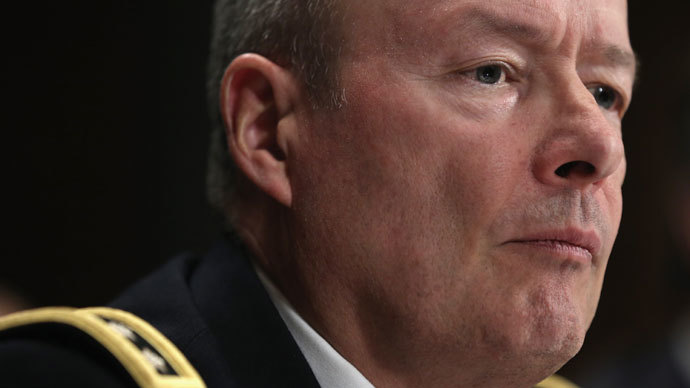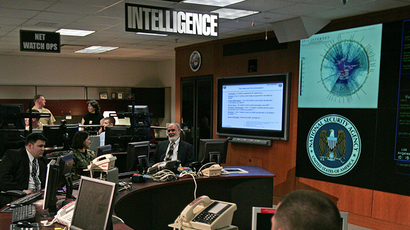Let us spy: NSA chief pleads with Senate to keep surveillance programs

The director of the National Security Agency implored lawmakers in Washington on Wednesday to continue authorizing the NSA’s controversial surveillance programs due to emerging threats against the United States.
Keith Alexander, the four-star general manning the helm of both the NSA and US Cyber Command, admitted during an afternoon hearing before the Senate Judiciary Committee that the American intelligence community is unsure of how to effectively monitor potential terror threats without the tools provided to them under the Patriot Act and the Foreign Intelligence Surveillance Act, or FISA.
Top-secret NSA documents leaked to the media by former intelligence contractor Edward Snowden throughout 2013 have raised numerous questions about the agency’s tools and techniques and their subsequent impact on the privacy of Americans. Despite growing opposition, however, Gen. Alexander defended those practices and said that abandoning them in lieu of yet-to-be-determined alternatives could gravely damage the national security of the country.
Under Section 215 of the Patriot Act and Section 702 of FISA, the NSA is allowed to collect records pertaining to Americans’ phone calls and the internet habits of suspected foreign targets, respectively. Critics of these programs have called the NSA’s powers to be overbroad, however, and equated the FISA Court that signs-off on such surveillance as being all too trigger happy with rubber stamp approvals.
Speaking amid a continuing stream of similarly damaging Snowden leaks, Gen. Alexander and cohorts at the top of the US intelligence community said to the Senate committee this week that there are no viable alternatives at this time for the NSA to consider.
“I can’t think of a better way,” Alexander said during the roughly 90-minute hearing on Wednesday.
“It’s like holding onto a hornets nest,” he continued. “We’re getting stung,” he said, but “…nobody’s come up with a better way.”
“If we let this down, I think we’ll let the nation down. So that’s why I’m concerned,” Alexander said.
The September 11, 2001 terrorist attacks were evoked no fewer than three times during the first 15 minutes of the hearing — including by Alexander, who said that the abilities afforded to the NSA in the years since have allowed the agency to conduct surveillance that could have very well stopped 9/11 had they been in place then.
Before then, Alexander said, “We couldn’t connect the dots because we didn’t have this capability to say someone outside the United States is trying to talk to somebody inside the United States.”
According to the NSA chief, being able to “connect the dots” by way of logging all telephony metadata — millions of records a day containing basic information pertaining to phone calls controlled by American companies — is the government’s only solution so far that effectively monitors extremism while balancing the civil liberties of US persons.
“There is no other way that we know of to connect the dots,” he said, adding that the threat against America is growing and abandoning those programs would be “an unacceptable risk to this country.”
“Taking these programs off the table, from my perspective, is absolutely not the thing to do,” he said, while agreeing that no alternative is at this time viable.
“Today we have not been able to come up with a better way of doing it,” he said. “I don’t think anybody at NSA or the administration is wed to a specific program, but we do need something to help connect the dots,” he continued, “And I think these programs have been effective.”
Others have argued that claim, however, and the NSA’s insistence at the wake of the Snowden scandal that those programs helped thwart dozens of terrorist plots have since been proven to be inaccurate. Indeed, Gen. Alexander himself said earlier this year that the Patriot Act and FISA provisions helped stop 54 terrorist attacks, only to later admit he exaggerated. On Wednesday, he again acknowledged that there was only “one unique case” under Sec. 215 where metadata helped investigators.
Citing worsening tension in the Middle East, however, Alexander said those programs can’t be put to rest at a time when not letting any bit of information to land in the NSA’s net could prove to be catastrophic. And according to the intelligence community, safeguards in place right now are adequately protecting the civil liberties of millions of Americans.
But even Sen. Patrick Leahy (D-Vermont), the chairman of the committee who shared his personal recollections of 9/11 during Wednesday’s hearing, warned that Americans could be losing their basic rights by way of the NSA’s programs.
“We give up a lot of our privacy in this country, and frankly I worry about giving up too much,” Leahy said. “Can we be totally secure? Of course we cannot. “
Elsewhere during the event, Sen. Al Franken (D-Minnesota) suggested that the US at large could benefit from adjustments to the NSA’s programs with regards to oversight and accountability.
“The American people are skeptical of executive power,” Sen. Franken said. “That when there is a lack of transparency, they . . . tend to be very skeptical and suspect abuse.”
Lawmakers are reportedly suspicious as well, at least according to remarks made earlier on during Wednesday’s hearing by Sen. Chuck Grassley (R-Iowa). Grassley told Deputy Attorney General James Cole during the event that he asked the Justice Department more than two months ago for details on intelligence community officials who have been disciplined in the wake of the Snowden revelations but has yet to receive a response. And with regards to Snowden himself, the director of the NSA admitted during the hearing that the contractor-turned-leaker got away with releasing a trove of documents because the structure of the very intelligence community being considered for reform allowed him to do so with ease.
“His job was to move data. He was the person who was to move the books from point-A to point-B,” Alexander said. “His job was in fact to do what he did. And therein lies part of the problem.”
According to the NSA chief, his agency is in the midst of announcing 41 different actions being rolled-out by the office’s director of technology that employs best industry practices to prevent another leak on par with the one attributed to Snowden. Meanwhile, new classified documents released to the media by Snowden and reported on this week show that the NSA have infiltrated computer games to gather intelligence, and relied on computer cookies to track targets to be hacked by the US government.
Alexander and Cole were joined in the Senate on Wednesday by co-panelist Robert Litt, the general counsel for the Office of the Director of National Intelligence.














